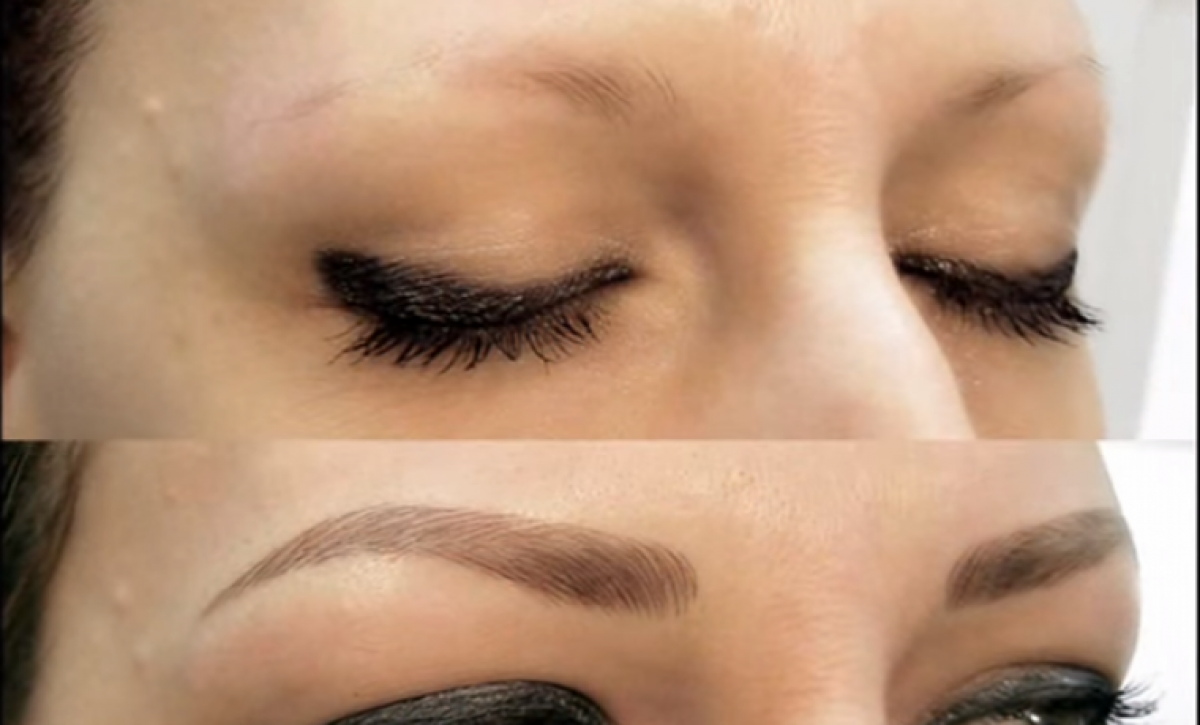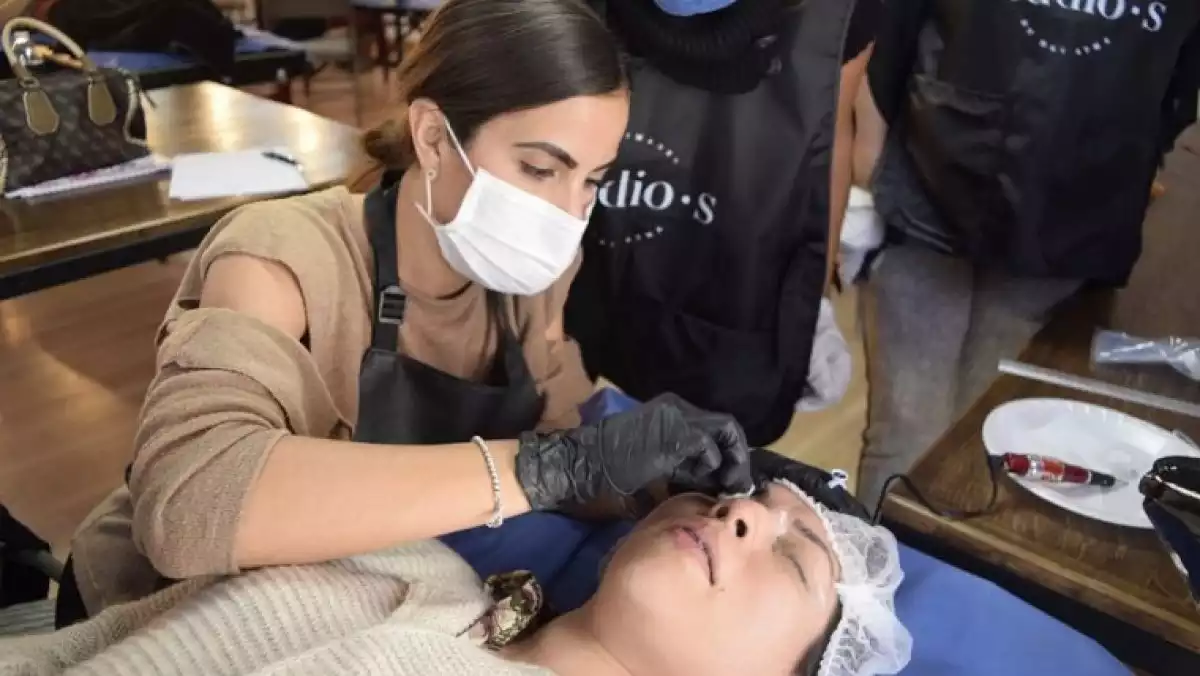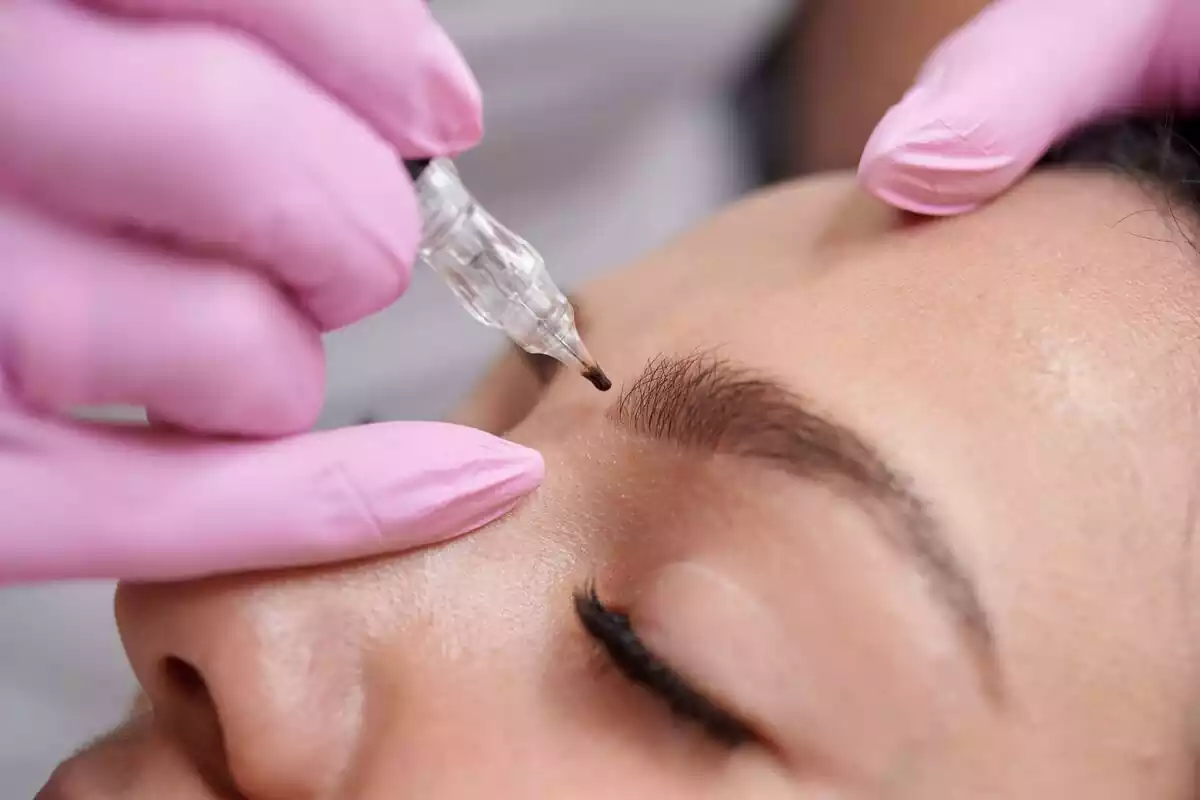Microblading is an eyebrow enhancement technique that improves the shape, definition, and thickness of the brows and it has become increasingly popular since 2015. Microblading allows people all over the world to stop worrying about their make up, either smudging or washing it off accidentally.
It is suited for all types of eyebrows, with equally luscious effects, and although it seems similar to the process of tattooing the eyebrows, there are some critical differences. We will examine the definition of microblading, the prices of this procedure, and what the process entails. We will also have a look at the primary differences between microblading and tattooing.
What is microblading?
Microblading is defined as a tattooing technique in which a small handheld tool made of several tiny needles (which act as blades) is used to add semi-permanent pigment to the skin. It not only involves a semi-permanent tattoo but also designing the ideal eyebrow shape for each face type. Specialized centers focus on creating a customized eyebrow design for each client, depending on their facial features and individual taste. Due to the handheld tool used in this process, the designs are exact and resemble a natural eyebrow.
To achieve the hair-like strokes, professionals use a device similar to a tattooing gun which has an inclined tip with 10-12 fine needles at the end. These needles are responsible for creating the cuts where the pigment will be placed. Unlike with tattooing, the device only pierces the upper region of the dermis, making a thin cut - similar to a paper cut, where the pigment is later applied. The name of this procedure is rather self-explanatory, as micro means small - therefore microblading references the tiny blade-like needles used to cut the eyebrow skin.
Benefits of this method
Considering that each stroke is done individually, the microblading specialist can control the shape, the color, and fullness of the eyebrows. The most common benefits of microblading include the following:
Gain fullness
Better definition
Improve patchy eyebrows
Complete reconstruction
Time saver
Can last up to 3 years
This eyebrow enhancement technique is currently regarded as the most effective semi-permanent solution, considering that the needles create fine, natural-looking strokes.
Microblading prices
The price of a microblading treatment ranges from 400 - 600 euros (450 US dollars or 9000 Mexican pesos), on the lower end of the spectrum, and goes up to 2000 euros, in some of the most exclusive centers. The procedure involves an initial pigmentation visit and 6-8 weeks later, a touch-up session, and usually, the price includes both.

Microblading vs. Eyebrow tattoo
There are many differences between these two techniques of eyebrow enhancement. We will list the main factors that set microblading and tattooing aside.
Permanence
Unlike eyebrow tattooing - which is permanent, microblading is a semi-permanent technique which allows the color to penetrate a superficial region of the skin, resulting in natural-looking eyebrows.
Eyebrow tattooing uses tattoo ink while microblading uses a specialized pigment. Ink differs significantly from the pigment in how it fades over time. As tattoo ink fades, it often develops a blue-green colored tint, especially around the edges of the tattoo.
Natural-looking outcome
The hair strokes achieved in microblading are finer and identical to the hair growth pattern of the brow; thus a more natural look is achieved. The handheld microblading tool is equipped with tiny needles that instead of puncturing the skin, like in tattooing, make small cuts. On the other hand, tattooing the eyebrows can result in a "drawn on" and flat look.
Step by step design
To get a clear view of what the process of microblading entails, we will have a look at each stage - from the initial consultation to the touch-up visit.
1. Eyebrow analysis
An essential step before getting eyebrow enhancement treatment is to schedule a meeting with a cosmetologist and discuss your ideas and agree on the best eyebrow design. This initial phase is so your technician can see what they’re working with and also what you like.
2. Measurements
The next step is to take exact measurements and determine where the brows should be placed, taking into account face symmetry and facial features. The new eyebrows are penciled in which will give the specialist a guideline for the microblading step of the process.
3. Numbing the area
Before starting the actual procedure, the eyebrow area is separated, and a topic anesthetic is applied that should last for about 40 minutes until the procedure is done. Although many centers claim this is a painless procedure, you must keep in mind that your skin is being cut, so it makes sense that it hurts.
4. Microblading
Once the procedure has begun, the cosmetologist will etch tiny hair-like strokes using a micro blade. The pigment will later be applied to these small cuts. If there is any severe discomfort, another layer of numbing cream can be applied.
5. Pigmenting
Microblading in a process done in layers, so after all of the cuts have been made the pigment layer is applied for 5 minutes on the whole region of the brow. The eyebrow is then wiped clean and the process is finalized.
6. Touch up
Microblading in a two-phase procedure because after the actual treatment takes place, the client must return within the next 6-8 weeks for a touch-up. This is when any remaining patches are filled up with extra pigment. Also, during this final step, any areas of the brow that haven't healed properly are treated so that the final result can be the intended one.

Microblending FAQ
To discover more about this semi-permanent make-up technique, we will have a look at some of the most frequently asked questions about microblading.
Where to get it?
There are many microblading centers around the world, with renowned centers in the US and Canada, Europe, Asia, and South Africa. Microblading has become a very sought after eyebrow enhancement method and many capital cities already have specialized professionals working with this technique.
Does it cause allergies?
Although many people have allergies to different types of pigments, microblading very rarely causes any allergies. As a part of the microblading process, the cosmetologist tests the client's skin before the procedure as to avoid any inflammatory responses. There are, however, special pigments explicitly designed for anyone struggling with allergies.
How long does it last?
Once the healing phase is complete, the results can last between 18 - 24 months depending on the type of skin the person has and which technique was used in the microblading process.
Some people with oily skin have experienced different results as excess oils in the skin will make it more difficult for the pigmented strokes to heal.
Does it hurt?
Although a numbing cream is used before the procedure, we are still dealing with small cuts on your skin which will generate a certain degree of pain. Discomfort levels vary from person to person, some have compared it to tweezing while others have said it's just as painful as a regular tattoo.
Another small discomfort might be caused by the scraping sound the device makes as it creates the fine strokes.
Can you remove it?
Considering that the pigment is not placed deep underneath the dermis, with the help of specialized techniques, the effects of microblading can be safely removed.
An important thing to remember, however, is that in the first ten days after the procedure your brows will look 40% darker. Fret not as this will fade away, leaving your eyebrows looking naturally luscious and full.
References:
McIlwee, B. E., & Alster, T. S. (2018). Treatment of Cosmetic Tattoos: A Review and Case Analysis. Dermatologic Surgery, 44(12), 1565-1570.
Isabelle's permanent make-up (2018). Hair by hair Micropigmentation & Microblading[online]. Available at https://www.isabelles.es/en/micropigmentation/hair-by-hair-micropigmentation/[Consultado 10 ene. 2019].
